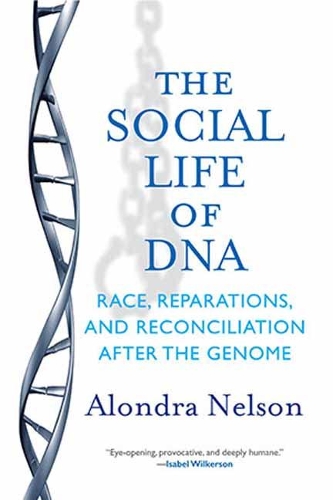
The Social Life of DNA: Race, Reparations, and Reconciliation After the Genome
(Paperback)
Publishing Details
The Social Life of DNA: Race, Reparations, and Reconciliation After the Genome
By (Author) Alondra Nelson
Beacon Press
Beacon Press
1st September 2018
14th June 2017
United States
Classifications
General
Non Fiction
305.896073
Physical Properties
Paperback
216
Width 153mm, Height 228mm, Spine 15mm
329g
Description
Alondra Nelson delved into genealogy and DNA for more than a decade, and realized that genetic testing is being used to grapple with the unfinished business of slavery. It is being used for racial reconciliation, to establish ties with African ancestral homelands, to rethink citizenship, and to make unprecedented legal claims for slavery reparations based on genetic ancestry. Arguing that genetics offers a new tool for enduring issues, Nelson shows that the social life of DNA is affecting and transforming twenty-first-century racial politics.
Reviews
Meticulously detailed. Nelson adds another chapter to the somber history of injustice toward African-Americans, but it is one in which science is enriching lives by forging new identities and connections to ancestral homelands.
Kirkus Reviews
The Social Life of DNA is an important contribution to many literatures and will undoubtedly serve as a catalyst for academic and public discussion of the intertwined relationships among race, science, and policy in the coming years.
Sociology of Race and Ethnicity
One of this generations most gifted scholars examines the unfolding mysteries of DNA sequencing and the limits and promises of genetic genealogy at the intersection of race, politics and identity. Alondra Nelson brilliantly guides us on a journey of discovery in this cautionary tale of the high-stakes efforts to reconcile our racial origins and to find redemption as a country. Eye-opening, provocative and deeply humane.
Isabel Wilkerson, author of The Warmth of Other Suns
Alondra Nelson takes us into a complex and endlessly fascinating space where genetic ancestry testing meets racial politics. With her unique and wonderful gifts for research and insight into genetic science, ethnography and history, The Social Life of DNA comes at a moment when the questions it raises about race and social justice couldnt be more pressing and urgent.
Rebecca Skloot, author of The Immortal Life of Henrietta Lacks
Nelson explores this large, sprawling, fascinating subject with clarity, passion, rigor, and a keen eye for revealing detail. The Social Life of DNA will appeal to a broad readership interested in history, race, and science. Geneticists, sociologists, anthropologists, political scientists, and jurists will be stimulated by reading this book. It is a brilliant work.
Randall Kennedy, Michael R. Klein Professor at Harvard Law School and author of The Persistence of the Color Line
Alondra Nelson tells a story for anyone interested in their own family, even their own memory. Using fresh genetics research and writing like an investigative reporter, Nelson clears up the mystery about our societys rush to DNA.
Edward Ball, author of Slaves in the Family
The Social Life of DNA is a brilliant ethnography of the recreational uses of DNA...Timely and original, this book offers a nuanced and engrossing negotiation between genetic truth and truthiness.
Patricia J. Williams, James L. Dohr Professor of Law at Columbia University and columnist for The Nation
The double helix now lies at the center of some of the most significant issues of our time, Alondra Nelson writes in this valuable and illuminating book. Since 2003, she has been following the ways that DNA intertwines with race, and The Social Life of DNA is her clear-eyed, sharp, and closely observed account of the phenomenon. It couldnt be more timely.
Jonathan Weiner, Maxwell M. Geffen Professor of Medical and Scientific Journalism at Columbia Journalism School
Alondra Nelsons account of how genetic data was transformed into contested political culture is a lucid as it is path-breaking. This exhilarating survey of how DNA became an agent in the politics of reparation and reconciliation has not only extended analysis of race and racism but created a new field of comparative research.
Paul Gilroy, professor of American and English literature, Kings College, London
Author Bio
Alondra Nelson is Dean of Social Science and professor of sociology and gender studies at Columbia University. She is author of the award-winning book Body and Soul- The Black Panther Party and the Fight Against Medical Discrimination and her writing has appeared in the New York Times, Washington Post, Science, Boston Globe, and the Guardian. She lives in New York City.
